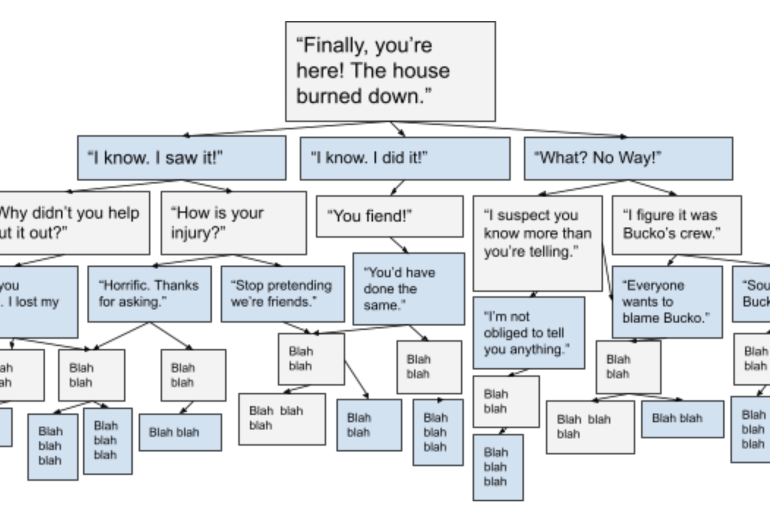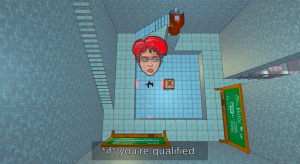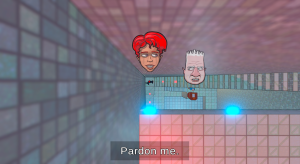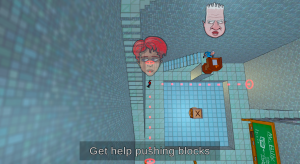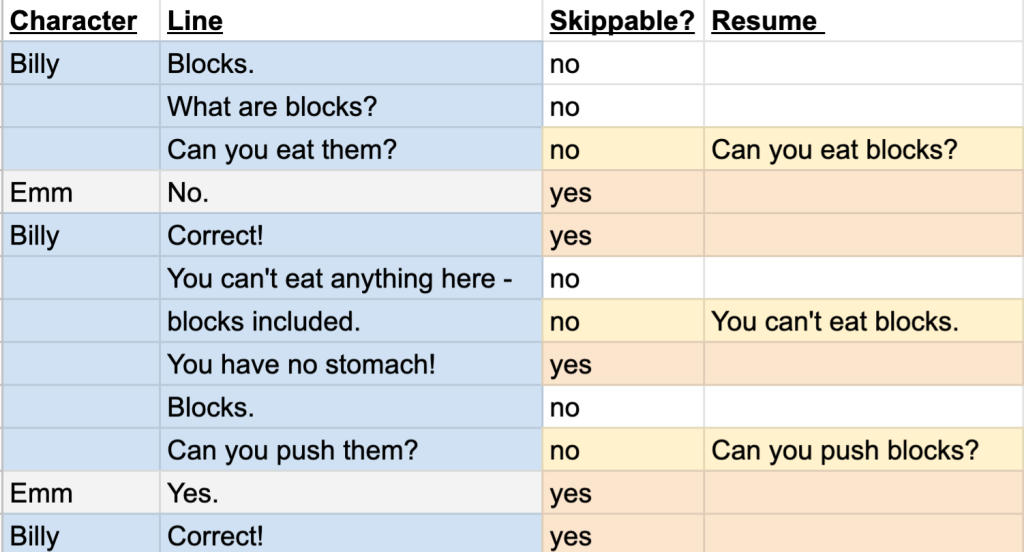There have been times when I sat down to design interactive dialogue, and it just sprawled out of control. I try to get clever and make the dialogue reflect all kinds of nuances. I sometimes hope for the ELIZA illusion, where the player is fooled into thinking they’re conversing with someone intelligent despite the algorithm handling the discussion being simple.
If I’m using a freeform flowchart kind of topology to design dialogue, it can easily blossom into an unruly space of possibilities that gets difficult to maintain. My adventure game, like most others, needs simplified conventions for dialogue. I’m not building an AI or a massive choose-your-own-adventure game.
There’s so much that’s been written about interactive storytelling, particularly by people like Chris Crawford. Instead of rehashing, let me just quickly explain the one thing I figured out for my game that’s pretty good.
I have NPCs that have got something a little lengthy to say – I call it a “spiel”. But in The Godkiller, you never get locked into conversations. You walk up to characters, and if they’ve got something to say, they’ll start talking through the spiel.
Here, the player puts our main character Emm next to Billy who wants to give a lecture on pushing blocks.
Emm catches the second part of “You can push blocks, if you’re qualified,” and suddenly decides she’s got better things to do. So she bolts up the stairs. Note that there is no explicit exit from a conversation menu. The player just goes about their business inside the game (not meta UI), and characters react and speak accordingly.
Despite her politely excusing herself, Billy is irritated. But he stops giving his lecture. Later Emm returns.
And Billy continues his lecture from the previous point. There is some intelligence to the spiel data structure that will choose the correct reentry point and dialogue text so that the conversation feels natural.
The structure of a spiel looks like this:
The dialogue that will be spoken if the spiel goes uninterrupted is in the “Line” column. And the handling of interruptions is in the “Skippable?” and “Resume” columns. No matter which line I interrupt the conversation at, the dialogue will still sound natural when it is returned to. The problematic lines are the ones that are phrases midway through a sentence or rely on some context from a previous statement. I can make these orphaned lines skippable, which means dialogue resumes at a line coming after them. I can also use an alternate line to resume with, e.g. “Can you eat blocks?” instead of “Can you eat them?”.
Using the rules above, the player can interrupt the conversation at any point, and it will resume naturally. You can see how every possible interruption would affect dialogue in the chart below. (Click the image for full-sized version.)
If I had flowcharted the same set of interactions, well… I’d be writing this article from a mental hospital. That chart would be freakishly complex. This is why getting some simplified conventions for interactive dialogue is important.
Using the spiel structure, there is another nice opportunity that can be unlocked here. Interjections are easily accommodated. In this “mock tutorial” scene I’ve been describing, the player’s character, Emm, can antagonize Billy by doing things inside the room. She can climb the steps to his podium or push the block around. Billy will stop his lecture to shriek at Emm about something she is doing at that moment in the game, and then resume the lecture seamlessly.
If you want a demo of this interactive scene, check out the video below from my Twitch stream.
This approach isn’t the best for every game. But it totally works for The Godkiller with its emphasis on using dialogue to complement the main gameplay actions of the player.
| The Godkiller – Chapter 1 is a 3D puzzle-solving adventure game available for Windows and Mac on Steam! |

